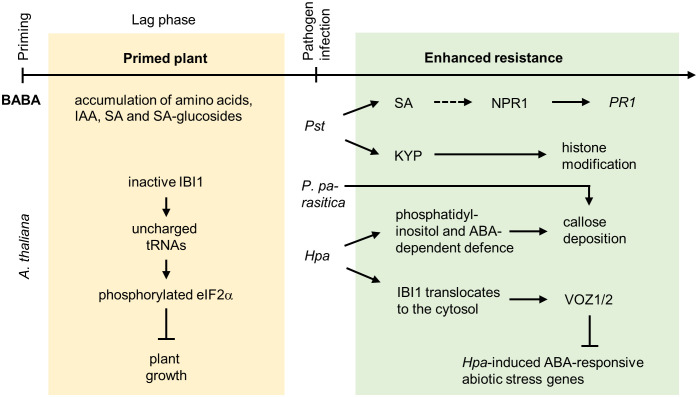Figure 4.
Priming by β-aminobutyric acid. In Arabidopsis, the R enantiomer of BABA, which is structurally similar to L-aspartic acid, is perceived by IMPAIRED IN BABA-INDUCED IMMUNITY1 (IBI1) representing an aspartyl-transfer RNA (tRNA) synthetase located in the endoplasmic reticulum. Binding of BABA inhibits the activity of IBI1. This increases the content of uncharged tRNAs, which causes the phosphorylation of the translation initiation factor eukaryotic Initiation Factor 2 subunit alpha (eIF2α). This leads to BABA-mediated suppression of plant growth and reproduction. Besides this inhibitory effect on plant growth, BABA primes the production of amino acids, IAA, SA and SA-glucosides, and xanthosine. BABA enhances the plant primary metabolism by induction of compounds belonging to the tricarboxylic acid cycle, potentiates the phenylpropanoid and phenylpropanoid biosynthesis and the octodecanoic pathway. Depending on the pathogen attacking Arabidopsis, priming by BABA involves SA- and SAR-dependent or ABA-dependent signaling pathways. In the case of Pst infection, BABA primed resistance involving a potentiated expression of the defense gene PATHOGENESIS-RELATED PROTEIN1 (PR1), which is regulated through NONEXPRESSOR OF PATHOGENESIS-RELATED GENES1 (NPR1). NPR1 is especially important for long-term priming by BABA (dashed line arrow), short-term priming is independent of NPR1. The primed state is maintained by the histone methyltransferase SUVH4/KRYPTONITE (KYP), pointing to the involvement of epigenetic regulations. Interestingly, neither SA nor SAR are important for priming by BABA to infections with the oomycetes P. parasitica or Hpa. Priming by BABA against Hpa infection involves phosphatidylinositol- and ABA-dependent defense responses resulting in increased callose deposition. In addition, BABA primes the Hpa-induced translocation of IBI1 from the endoplasmic reticulum to the cytosol, which results in the interaction of IBI1 with defense regulators, such as the transcription factors VASCULAR PLANT ONE ZINC FINGER1 (VOZ1) and VOZ2. VOZ1/2 suppress the Hpa-induced expression of ABA-responsive abiotic stress genes and enhances VOZ1/2-dependent expression of genes regulating (early) PTI.

